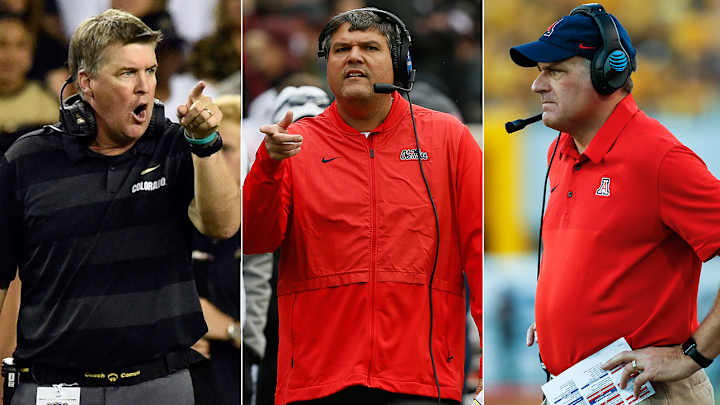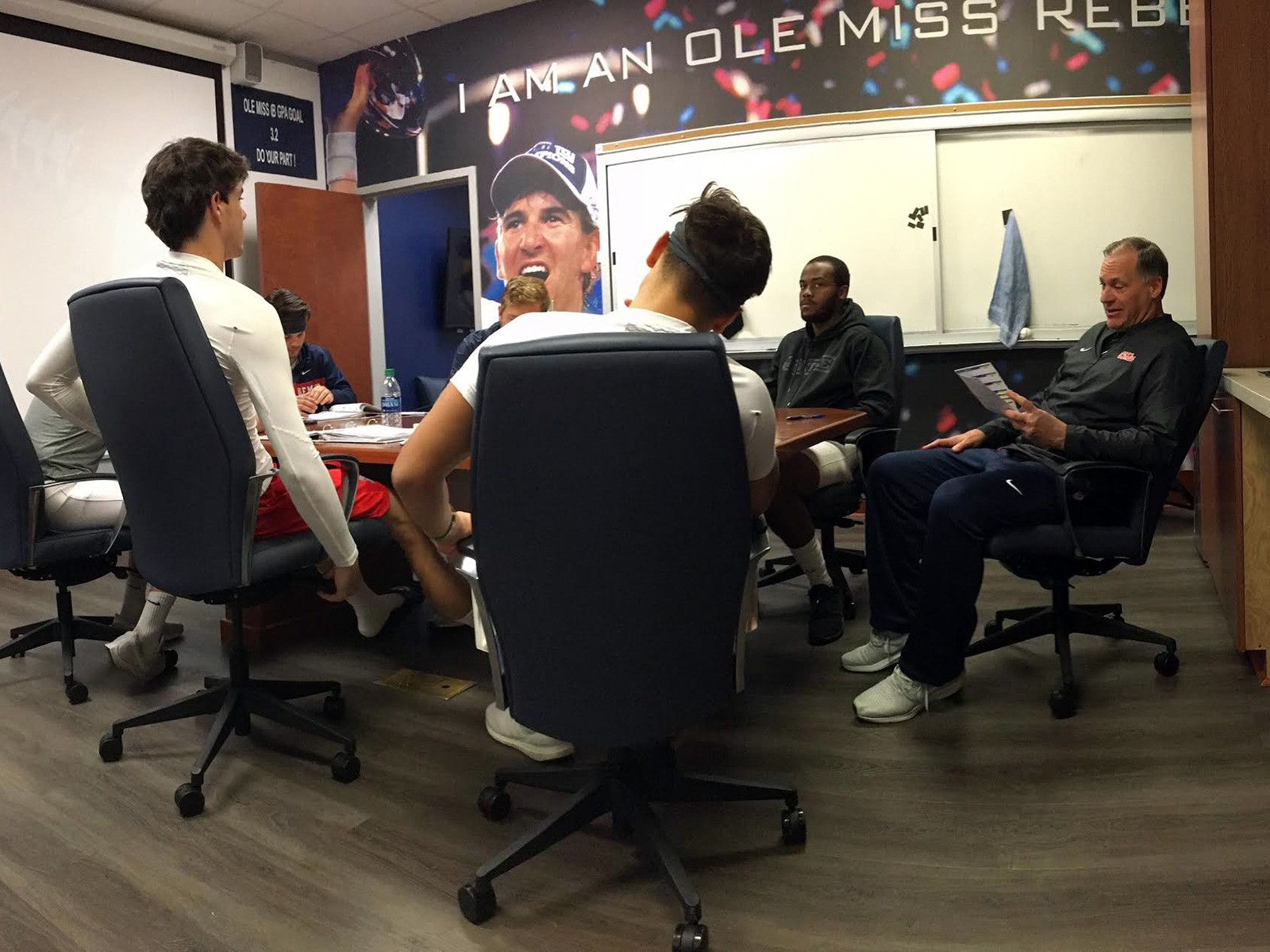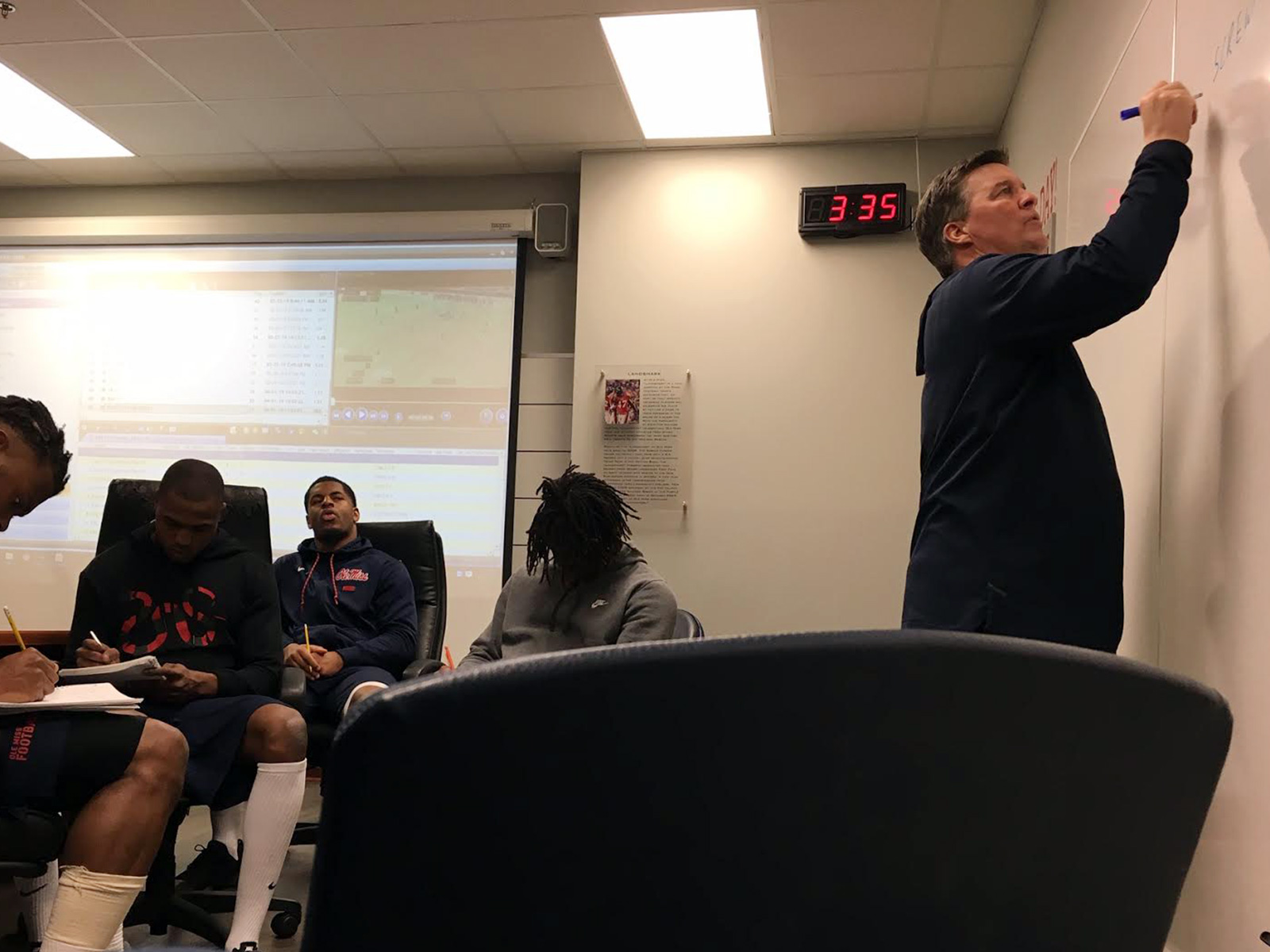Matt Luke Welcomes Big Names, Big Questions as He Makes the Ole Miss Coaching Staff His Own

OXFORD, Miss. — On a recent spring day inside Ole Miss’s football operations building, offensive coordinator Rich Rodriguez and defensive coordinator Mike MacIntyre are seated on either side of head coach Matt Luke to begin a 9 a.m. staff meeting. Before the football talk starts, assistants pass around a football, to be signed and later given away at an alumni function. The football arrives in front of offensive line coach Jack Bicknell, the staff’s resident humorist. He picks up the ball and glances around a quiet room. “Do they want me to autograph this, or is it just for former head coaches?” asks Bicknell, breaking the room into laughter.
Bicknell is actually a former head coach himself, having gone 42–53 at Louisiana Tech from 1999 to 2006, but he likes to joke that he’s a forgotten man on Luke’s new-look staff, overshadowed by a pair of splashy coordinator hires that Ole Miss is aggressively marketing to its fans.
“Well, I’m a former head coach, too!” Bicknell later says over lunch. “You put that in the story. There are three former head coaches on staff here, not two.” Rodriguez chuckles from across a table. “Jack beat Alabama,” he says with a smile.
The Bulldogs’ 1999 victory over the Crimson Tide aside, the buzz around Oxford is about the two recently fired head coaches—Rodriguez from Arizona and MacIntyre from Colorado—atop Matt Luke’s list of assistants, coordinating their units of expertise as Ole Miss tries to climb out of a hole from the NCAA penalties incurred by past regimes. The Rebels will be the only team in the FBS entering 2019 with two former Power 5 head coaches as their offensive coordinator and defensive coordinator. (Ohio State provided last season’s most similar dynamic, with OC Kevin Wilson and DC Greg Schiano among the four coordinators working under Urban Meyer.) “It doesn’t happen all that often to have one—to have two seems exceptionally rare,” says industry insider Scott Roussel, president of FootballScoop.com, a site devoted to football coaching news.
Thirty-five coaches were fired or pushed out from Power 5 head coaching jobs over the past five seasons. Only nine of those coaches are currently on a college football staff as a full-time assistant, whether a position coach or coordinator. Two of them are in Oxford, where the eyes of the college football world will be watching this fall to determine if this will really work.
From behind his desk in Oxford, the 42-year-old Luke exudes confidence about his decision to hire one man who hasn’t been an assistant in 19 years and another who hasn’t in 10 years to be his top-ranking lieutenants. Ahead of his third season since taking over for Hugh Freeze, Luke has surrounded himself with big names and big personalities, given control of his units to men with names more recognizable than his. “I don’t think you can worry about egos,” he says. “You hire the best people to win football games.”
The coordinator hires, among other things, have Luke feeling like this place is finally his. A majority of his roster is made up of players who signed to play for him as head coach, and the Rebels are finally back to the NCAA limit of 85 scholarship players. He now has his own staff in place after retaining for a second season the Hugh Freeze assistants that helped him land the full-time job in the winter of 2017. (“I couldn’t sit around that table in that staff room and say, ‘Hey guys, thanks for helping me get this job, you’re fired,’” Luke says.) Most importantly, the cloud of NCAA discipline—a two-year postseason ban, recruiting restrictions and scholarship limitations as a result of violations committed under Freeze and Houston Nutt—that has lingered over the program for a half-decade is now in the rearview. To Luke, this feels like year one and not year three. His boss feels the same. “Now I think we can take off,” says Ole Miss athletic director Ross Bjork. “It is like starting over.”
Bjork is the one who approved both coordinator hires and their hefty salaries: $1.5 million for MacIntyre and $900,000 for Rodriguez. Bjork also helped lead the vetting process that explored the controversies that mired both men’s last career stops. MacIntyre was accused of not properly handling allegations of domestic violence that were revealed to him in December 2016 by the ex-girlfriend of Colorado assistant coach Joe Tumpkin. After an independent investigation, Colorado ordered MacIntyre to make a $100,000 donation to domestic violence causes in the summer of ’17, and last year a federal judge dismissed a lawsuit against him and other school officials filed by the ex-girlfriend, Pamela Fine. (Tumpkin was forced to resign in January ’17 and charged with five counts of felony second-degree assault, but this April he was sentenced to 30 days in jail and 30 months of probation as part of a misdemeanor plea deal.) MacIntyre was given a contract extension days after the announcement of his discipline but was fired after consecutive 5–7 seasons in ’17 and ’18.
Rodriguez was fired by Arizona without cause on Jan. 2, 2018, the university’s response to a notice of claim filed by a former administrative assistant, who accused the head coach of sexual harrassment. The claim was never filed in court, and an outside law firm that Arizona hired to investigate the claim concluded the accusations could not be substantiated, but the school said that other details were found within the investigation that “caused it to be concerned with the direction and climate of the football program.”
Rodriguez described the claim as an attempt at extortion linked to an extramarital affair he later admitted to having with a woman who did not work at the university. He learned of his firing from a USA Today reporter before he received the formal email from the school. It still stings more than 15 months later. “I’m frustrated. I’m not going to agree with it ever,” Rodriguez says now. “What happened was hard to believe, and how it happened was hard to swallow. Having that cloud, when it was totally ridiculous in certain aspects ... I try not to think about it, because I get mad.” Many schools flirted with Rodriguez this offseason, but several deemed him as damaged goods. “They had reservations, ‘Well, we heard…’” he says. “Pleasing to me was Ole Miss vetted this thing really thoroughly, and the SEC did, too.”
Luke describes his two new coordinators as “polar opposites.” Rodriguez is boisterous and animated, having broken “a few” headsets during the first few weeks of spring practice, Luke says. The coach’s voice booms across Ole Miss practice fields on a sun-splashed spring day with words not fit for print. He’ll later drop a few dollar bills into a jar marked “swear cup” that sits in the quarterbacks meeting room. “I see some $10s and $20s in the swear jar some days,” says quarterback Matt Corral, a redshirt freshman from California who is expected to take over for Jordan Ta’amu as the Rebels’ starter. “Some people don’t like the way he coaches. He comes at you. I like that.” MacIntyre is calm and quiet, a more cerebral coach who communicates in more whispers than screams. His overhaul of one of the worst defenses in the FBS starts with this spring’s transition from a 4-2-5 to a 3–4 front. The Rebels have not cracked the top 100 in total defense the last three seasons, leaving them exposed in a league that prioritizes that side of the ball. MacIntyre knows that in-house positivity is key to changing the culture. “Away from here, they hear, ‘Y’all aren’t any good, you’re terrible,’” he says. “Here, they don’t need to hear that.”

Inside the two coordinators’ position meeting rooms—MacIntyre coaches the safeties, Rodriguez the quarterbacks—they are comfortable in their roles as the leading voice. But Luke runs team meetings, organizes practices and holds news conference because, you know, he’s the head coach. This is an adjustment for two guys with a combined quarter-century of heading coaching experience. Rodriguez, who was last an assistant in 2000 under Tommy Bowden at Clemson, has found himself yelling at practice toward a defender, kicker or manager only to quickly shut his mouth. Oh, that’s Matt’s job. Maybe this is why so many former Power 5 head coaches choose another route for their next job. “It’s not an easy thing,” Roussel says. “It’s hard to throttle down your leadership.” Of those 35 Power 5 head coaches to lose their job over the last five years, 11 are back as head coaches, many dropping down in competition level with the notable exception of new Arizona Cardinals coach Kliff Kingsbury. Eight are either retired or do not have a job, three are consultants or analysts on college support staffs and four are in the NFL.
Rodriguez and MacIntyre both hope to be head coaches again, but there’s no real rush. It’s not like they need the money; they will earn more than $12 million in combined buyout settlements from Arizona and Colorado. Then again, they are coaches who felt like they should be coaching. Rodriguez realized that during his year away from the sidelines when he found himself pushing a pair of Teacup Pomeranians in a double doggie stroller down his neighborhood street. There he was, the coach whose revolutionary offense led West Virginia to within a win of the national championship game, who coached Michigan and turned down Alabama, who tutored Pat White, Denard Robinson and Shaun King, and who was now taxiing his lazy pups, Roxie and Rambo. “It was sad,” Rodriguez says with a laugh. “It was a sad sight.”
Every coach not coaching has these moments, reminders of their true passions in life. MacIntyre had them, too, but his unemployment lasted just three weeks. Both coaches see this as the first step on the road to another head gig. “This is a great opportunity for RichRod to kick-start and revamp his career when it was dead in the water,” Roussel says. “Rich has often been rumored to be the guy who can light it up in the SEC and be that guy. Here’s his chance to prove it.” Rodriguez is 3–1 against SEC teams as a head coach, all the victories while with the Mountaineers. The offensive system that rolled up 502 yards in a 38–35 win over SEC champion Georgia in the 2005 Sugar Bowl is largely the same. Its staple remains a play that has spread to every level of football since Rodriguez introduced it as coordinator at Tulane and Clemson: the quarterback zone-read option.
Over the years, he’s made changes, like ditching a playbook that somehow made its way online a few years back. Now, players are left to create their own playbooks by taking notes during meetings, like the one Rodriguez held in the midst of a spring practice last month. “If the clock isn’t stopping, we’re not changing personnel,” he tells his group of quarterbacks. Rodriguez’s position meeting is only interrupted by a player creeping into his adjoining office to pillage a giant bucket of candy he keeps near his desk, purchased with the money he deposits in the swear cup. “I’m the candy man,” he says.
Don’t be fooled: Rodriguez is out to prove that his system can work in the nation’s most feared conference on a week-to-week basis. “Some coaches or players will say, ‘I don’t have anything to prove.’ Well, as long as they’re keeping score, you do,” he says. “I always feel there’s something to prove. I feel that way as much or moreso now as any time in my career.” He has plenty of motivation. He describes the full year off from coaching as the most frustrating of his life, and his firing prevented him from coaching his son Rhett, a rising junior quarterback. Rich watched from the stands last season like a normal parent, screaming toward the field as Rhett was briefly elevated to starter in mid-October. “He wanted to play for his dad,” Rodriguez says, getting emotional about the subject.

Down the hall from the quarterbacks meeting room, MacIntyre is teaching his safeties about defending the run-pass option, testing them on his blitz terminology and talking about bands of yesteryear. “I know y’all listen to a lot of Bon Jovi,” he says to a confused room of teenagers and 20-year-olds. “‘Livin’ On A Prayer’, one of the best songs ever written.” There are laughs among the players before the 54-year-old MacIntyre moves on to teaching fundamentals of third-down pass coverage he adopted while under Bill Parcells with the Dallas Cowboys. The defense MacIntyre is installing here is the one Parcells used to win a pair of Super Bowls. Only one other man has been more influential to MacIntyre’s football life than Parcells: his father. George MacIntyre was a 40-year veteran of the game, with head coaching stops at UT-Martin and Vanderbilt. George spent 1978 as the offensive coordinator at Ole Miss, and MacIntyre remembers as an eighth grader taking the bus from junior high to the football facility. Back then, George commissioned his son to splice 16mm game film. Mike would cut the film, mark the photos with a formation and tape them to the office wall. This is MacIntyre’s third stint in Oxford. He worked for four years as an assistant to David Cutcliffe before leaving in 2002 for the Cowboys. This place kind of feels like home: He’s just four hours from his native Nashville and he’s now working for an old buddy.
For Luke, these hires were no-brainers. MacIntyre is a career-long mentor, a man he coached with on Cutcliffe’s staff at both Ole Miss and Duke. MacIntyre helped connect Luke to Rodriguez. As Pac-12 South coaches, the two met annually on the field and waged recruiting battles against one another. Their meeting in 2017 resulted in Arizona quarterback Khalil Tate’s coming-out party. He ran for a single-game NCAA quarterback rushing record of 327 yards against MacIntyre’s defense in a 45–42 Wildcats win, the film of which is often played in Rodriguez’s position room to show his quarterbacks how to properly operate his offense. Rodriguez prods his counterpart about that day whenever he can—“He hates it,” Rodriguez says.
Eighteen months after that game, they find themselves on the same staff, brought together to help rebuild the Rebels by an alum trying to put his stamp on the program. Will it work? Some here say it already is. “I think our players have seen it,” Bjork says. “In talking to some of those guys, they’re like, ‘It’s night and day in terms of teaching structure and culture.’ I think you see Matt Luke putting his stamp on the program. It starts with Matt. He came to me and said I think I need to make some changes with the coordinator spots. ‘I want to try to hire the best.’ He did.”
